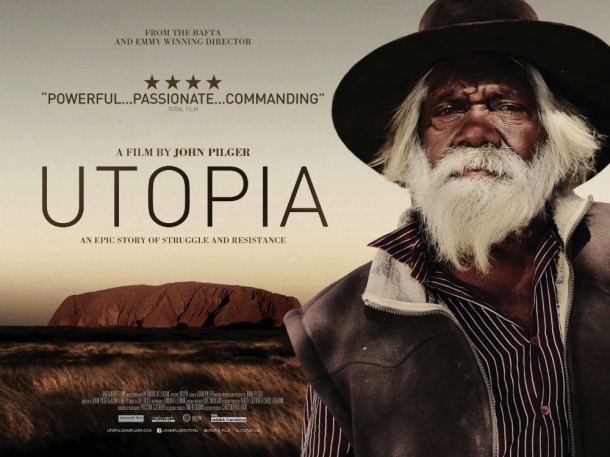
Veteran investigative journalist John Pilger took to the stage at Ritzy Cinema last night for a Q&A session on his new film Utopia.
Over a career spanning decades, Pilger has covered injustice, conflict and human rights abuses around the world: forging a reputation as a champion of under-represented voices.
Utopia is no exception. The London-based journalist returns to his native Australia to chart the systematic oppression and subjugation of the country’s indigenous population – a topic he has covered in previous documentaries such as his 1989 account ‘A Secret Country’.
Pilger told the crowd at the Ritzy that he was shocked at how little had changed since he first covered these issues years ago.
The narrative spans from the personal, quotidian, misery and impoverishment of many indigenous Australians – including shocking living conditions without sanitation or basic facilities, and deaths in custody for which no one has been prosecuted – to the bigger picture of racial politics and corporate exploitation in Australia.
Indeed some of the most appalling and shocking moments of Utopia are in the stories of everyday loss and marginalisation: from the widespread impact of trachoma in the aboriginal community (an entirely preventable infection causing blindness) to the galling statistics of incarceration. Although indigenous Australians make up only 3% of the country’s population, they account for a quarter of Australia’s prisoners. This statistic rises to around 60% for the state’s young prisoners.
But the film also lays bare the human impact of the arrival of rapacious mining companies – including the forced displacement of aboriginal communities – sanctioned by the Australian state through land seizures in pursuit of the country’s vast resources. Pilger makes the case that even a fraction of the profits from the mining companies could have been used by the government to revolutionise the living conditions and quality of life for Australia’s ‘first nation’.
One particularly disturbing section of Utopia deals with the Stolen Generations – a decades long policy in the 20th Century of the removal of aboriginal children from their parents under various pretexts – in its most extreme form representing an overtly racist eugenicist project of ‘breeding out’ the indigenous population. Interestingly, Pilger interviews Prime Minister Kevin Rudd, who in 2007 officially apologised to indigenous Australians for this period, calling it a ‘blemished chapter in our national history’. But Rudd has relatively little to say about ongoing abuses, as do various Ministers and ex-politicians who contribute to the film.
Pilger told the Ritzy’s audience that progress will only begin by the Australian state recognising the ‘notion of self-determination’ for its indigenous population.
Utopia is essential viewing for an insight into a deeply troubling issue in Australia. It is a story of acute poverty and disenfranchisement in one of the richest countries in the world, and a powerful and shocking account of a people not forgotten, but tacitly, passively and even actively persecuted by their own state.















During the aparteid years in South Africa the British government refused any sporting fixtures between the U.k. and S.Africa. We should treat Australia in the same way until they change their racist policies, and use some of the ridiculous profits from uranium mining to support the indigenous peoples. After watching John Pilgers programme, I’m surprised the Australian government can sleep at night. I thought that eugenics had ended in Nazi Germany!